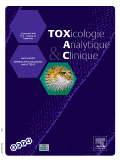
Toxicologie Analytique et Clinique
Scope & Guideline
Empowering Insights in Analytical and Clinical Toxicology
Introduction
Aims and Scopes
- Analytical Toxicology:
The journal publishes research on the development and application of analytical techniques for detecting and quantifying toxic substances in various biological matrices, including blood, urine, and hair. - Clinical Toxicology:
Research focused on the clinical implications of poisoning cases, including case reports and studies that evaluate outcomes and treatment strategies for intoxication. - Environmental Toxicology:
Investigations into the impact of environmental contaminants, such as heavy metals and microplastics, on human health and ecosystems. - Substance Use and Abuse:
The journal covers studies on drug abuse patterns, including emerging drugs and their health implications, as well as the role of substances in drug-facilitated crimes. - Guidelines and Best Practices:
The publication serves as a platform for disseminating guidelines and best practices in toxicological analysis and management of poisoning cases.
Trending and Emerging
- Chemsex and Substance Use Disorders:
An increasing number of studies are focusing on chemsex practices and their implications for public health, highlighting the need for clinical awareness and intervention strategies. - Impact of New Psychoactive Substances (NPS):
Research on the detection, effects, and clinical implications of NPS has surged, reflecting growing concerns over their prevalence and the need for updated analytical techniques. - Environmental Health and Contaminants:
There is a rising emphasis on the health effects of environmental pollutants, such as microplastics and heavy metals, indicating a broader understanding of toxicology's role in public health. - Drug Interactions and Toxicity:
Emerging studies are increasingly examining complex drug interactions and their toxicological implications, particularly in the context of polypharmacy and vulnerable populations. - Guidelines for Toxicological Analysis:
The publication of new guidelines and best practices for toxicological testing and interpretation is becoming a significant theme, aiming to standardize methods and improve clinical outcomes.
Declining or Waning
- Traditional Poisoning Cases:
There has been a noticeable decrease in the number of publications focused on traditional poisoning cases, perhaps due to the increased focus on newer substances and drug trends. - Chronic Poisoning Studies:
Research on chronic poisoning scenarios, particularly in occupational settings, has become less prevalent, indicating a potential shift in focus towards acute poisoning cases and immediate health impacts. - Historical Toxicology:
Topics related to historical cases of poisoning or the analysis of older substances are seeing a decline, as current research trends favor contemporary issues and emerging substances.
Similar Journals
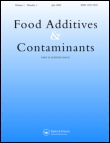
Food Additives & Contaminants Part B-Surveillance
Monitoring the unseen: safeguarding public health.Food Additives & Contaminants Part B-Surveillance, published by Taylor & Francis Ltd, is a premier journal dedicated to the rigorous analysis and surveillance of food additives and contaminants. With an ISSN of 1939-3210 and an E-ISSN of 1939-3229, this journal caters to a global audience, addressing crucial issues in the fields of Food Science, Public Health, and Toxicology. Recognized for its substantial contribution to these areas, it holds a Q2 ranking in both Food Science and Public Health, demonstrating its influence and relevance with an increasing audience within the scientific community. The journal publishes critical research from 2008 onwards and continues its commitment to advancing knowledge up to 2024. Ideal for researchers, practitioners, and students, Food Additives & Contaminants Part B-Surveillance serves as a vital platform for sharing innovative findings and fostering discussions that promote food safety and public health.

International Journal of Medical Toxicology and Forensic Medicine
Fostering Interdisciplinary Dialogue for Better OutcomesInternational Journal of Medical Toxicology and Forensic Medicine, published by Shaheed Beheshti Medical University of Medical Sciences & Health Services, is a pioneering platform dedicated to advancing knowledge within the critical fields of toxicology and forensic medicine. Established as an Open Access journal since 2011, it ensures wide dissemination of research findings, catering to a global audience of researchers, healthcare professionals, and students. With an ISSN of 2251-8762 and an E-ISSN of 2251-8770, the journal covers a diverse range of topics relevant to the medical community, albeit being categorized as Q4 in both Pathology and Forensic Medicine and Toxicology in 2023, indicating emerging significance in these disciplines. Geographically based in Tehran, Iran, it aspires to bridge gaps in scientific research and practice, particularly in regions where such expertise is critical. The journal welcomes submissions that investigate pressing issues in medical toxicology and forensic science, fostering an interdisciplinary dialogue essential for innovative solutions and improved public health outcomes.
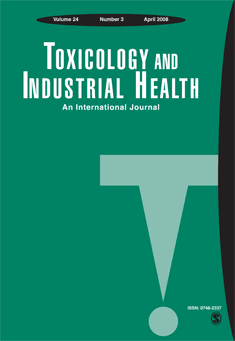
TOXICOLOGY AND INDUSTRIAL HEALTH
Innovating solutions for a healthier industrial environment.TOXICOLOGY AND INDUSTRIAL HEALTH, published by SAGE PUBLICATIONS INC, is a premier journal in the field of toxicology, public health, and environmental health, with a significant history dating back to 1985. With its ISSN 0748-2337 and E-ISSN 1477-0393, the journal provides a platform for disseminating groundbreaking research and comprehensive reviews that address the complexities of toxic substances in industrial and occupational settings. Despite its Q3 ranking among peers in health, toxicology, and public health, this journal is becoming increasingly influential, reflected in its growing citation metrics. Researchers and professionals benefit from its commitment to fostering knowledge in both theoretical and practical contexts, making it an essential resource for those dedicated to advancing understanding in this vital field. The journal's main objectives include promoting research addressing the implications of toxicology on health and safety standards across industries, ensuring accessibility to current studies for a global audience. Overall, TOXICOLOGY AND INDUSTRIAL HEALTH plays a critical role in bridging the gap between research and real-world applications, proving invaluable to students, professionals, and researchers alike in their pursuit of enhancing public health and environmental safety.
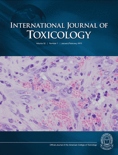
INTERNATIONAL JOURNAL OF TOXICOLOGY
Bridging Research and Practice in Toxicology.The International Journal of Toxicology, published by SAGE Publications Inc, serves as a cornerstone of scholarly research in the field of toxicology, with an established history dating back to 1982. This esteemed journal, ISSN 1091-5818 and E-ISSN 1092-874X, functions within the Q3 quartile in Toxicology, ranking 94 out of 133 in the Pharmacology, Toxicology and Pharmaceutics category per Scopus metrics, reflecting its commitment to advancing scientific understanding in this critical area. The journal not only aims to disseminate high-quality research but also encourages open access to vital studies, thus fostering collaboration and innovation among researchers, professionals, and students alike. With a focus on various aspects of toxicology, including but not limited to environmental, clinical, and molecular toxicology, the International Journal of Toxicology is dedicated to bridging gaps in toxicity research and promoting safe practices across numerous disciplines. As it converges towards 2024, the journal continues to play a vital role in shaping the discourse surrounding the implications of exposure to toxic substances in human health and the environment.
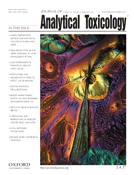
JOURNAL OF ANALYTICAL TOXICOLOGY
Unveiling Insights in Toxicology and ChemistryJOURNAL OF ANALYTICAL TOXICOLOGY, published by Oxford University Press Inc, stands as a leading platform in the field of analytical chemistry and toxicology, focusing on the rigorous exploration of methodologies and advancements in the detection of toxic substances. Since its inception in 1977, this journal has continually contributed to the scientific community, providing researchers and professionals with vital insights into chemical health, safety, and environmental implications. With an impressive Q1 ranking in both Analytical Chemistry and Chemical Health and Safety, along with reputable Q2 rankings in Environmental Chemistry and Toxicology, the journal maintains its critical standing in vibrant academic communities, ensuring the dissemination of high-quality research. Although it currently does not offer open access, articles are made available via institutional subscriptions, allowing widespread access to its valuable findings. Located in the United States, the journal contains a wealth of knowledge poised to benefit scientists and scholars engaged in toxicological research, emphasizing its importance in enhancing public health and safety.
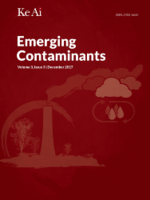
Emerging Contaminants
Bridging research and real-world impact on health.Emerging Contaminants is a leading international journal dedicated to the exploration and analysis of novel pollutants, their effects, and the methodologies for their detection and remediation. Published by KEAI PUBLISHING LTD in China, this Open Access journal has been at the forefront of scientific discourse since its inception in 2015, allowing unrestricted access to cutting-edge research. With an impressive categorization in the top Q1 quartile across diverse fields, including Health, Toxicology and Mutagenesis, and Public Health, it ranks remarkably high—41st out of 665 in Public Health and 10th out of 133 in Toxicology according to Scopus metrics, demonstrating its vital role in advancing our understanding of environmental health risks. By bridging the gap between academia and practical applications, Emerging Contaminants not only enriches the scientific community but also serves as an essential resource for policymakers and industry leaders seeking effective solutions to environmental challenges. Researchers, professionals, and students alike are encouraged to engage with the journal’s comprehensive studies and findings, contributing to a sustainable future.
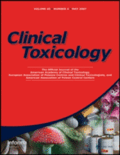
CLINICAL TOXICOLOGY
Your Gateway to the Latest in Toxicological ScienceCLINICAL TOXICOLOGY is a prestigious journal dedicated to advancing the field of toxicology, published by Taylor & Francis Ltd. With ISSN 1556-3650 and E-ISSN 1556-9519, it has been a vital resource for researchers, clinicians, and students since its inception in 1968. The journal is recognized for its high impact, boasting a Q1 quartile ranking in both the categories of Medicine (miscellaneous) and Toxicology as of 2023, reflecting its reputation for disseminating significant contributions to the field. CLINICAL TOXICOLOGY primarily features original research, reviews, and case reports that explore the latest advancements and methodologies in the diagnosis and management of toxic exposures, making it an essential tool for professionals seeking to stay abreast of current trends and best practices. The journal's open access options ensure that its content is readily available to a wide audience, thereby promoting the exchange of knowledge and collaborative efforts within the global scientific community. For those committed to improving public health outcomes through toxicological research, CLINICAL TOXICOLOGY provides an indispensable platform for publication and discourse.

Exposure and Health
Advancing knowledge on environmental impacts to enhance public health.Exposure and Health is a pioneering journal published by Springer, specializing in the interdisciplinary fields of health, toxicology, and environmental sciences. With an ISSN of 2451-9766 and E-ISSN of 2451-9685, this open-access journal exemplifies a commitment to disseminating high-quality research that informs public health practices and policies globally. Situated in the Netherlands, it boasts an impressive impact factor and ranks in the top quartile (Q1) across multiple categories in the 2023 Scopus rankings, including Health, Toxicology and Mutagenesis, Pollution, and Water Science and Technology. The journal is dedicated to advancing knowledge on the interactions between environmental factors and health outcomes, making it a vital resource for researchers, professionals, and students in these critical fields. Exposure and Health actively encourages submissions that address the challenges of exposure assessment, risk management, and the promotion of sustainable public health initiatives.

Journal of Environmental Science and Health Part C-Toxicology and Carcinogenesis
Transforming Environmental Insights into Health SolutionsThe Journal of Environmental Science and Health Part C-Toxicology and Carcinogenesis is a vital publication in the fields of environmental science, toxicology, and cancer research, published by Taylor & Francis Inc. With an ISSN of 2689-6583 and E-ISSN 2689-6591, this journal provides a platform for peer-reviewed research that explores the intersection of environmental factors and health outcomes, particularly focusing on toxicological and carcinogenic impacts. Though it does not currently offer Open Access, it remains a significant contributor to academia with its current ranking in the Q4 category for Cancer Research and Q3 in Health, Toxicology and Mutagenesis. The journal has converged from 2020 to 2024 and aims to disseminate pioneering studies that inform public health policies and foster a deeper understanding of environmental toxins. Aspiring researchers, professionals, and students will find this journal to be an essential resource for the latest findings and discussions within these critical fields.
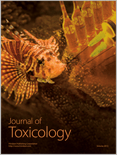
Journal of Toxicology
Unveiling the complexities of toxicology for a healthier world.Journal of Toxicology, published by HINDAWI LTD, stands as a pivotal open-access journal in the fields of toxicology and pharmacology since its inception in 2009. With an ISSN of 1687-8191 and an E-ISSN of 1687-8205, this journal is dedicated to disseminating high-quality research that critically examines the effects of toxic substances on living organisms. Located in Egypt and operating from their London office, it aims to provide an extensive platform for researchers worldwide to share findings that can inform better practices in safety and regulation. As of 2023, it has achieved significant recognition, holding a Q3 ranking in both the pharmacology and toxicology categories, and is indexed in Scopus with noteworthy percentile rankings (Toxicology: 57th and Pharmacology: 55th). With a focus on innovative studies and emerging areas such as environmental toxicology, biomarker research, and therapeutic interventions, the Journal of Toxicology invites both experienced researchers and students to contribute, thereby enhancing the breadth and depth of toxicological knowledge for the global scientific community.